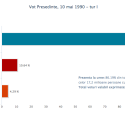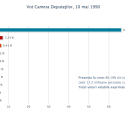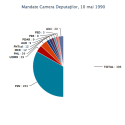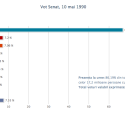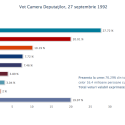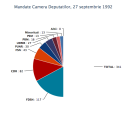IMPORTANT DEVELOPMENTS
- EUROPEAN FUNDS. The regional committee of the EP allows Romania to benefit from the N+3 rule.
- ENERGY. Victor Ponta pledges to seek Romania’s energy independence.
- SCHENGEN. Romania is ready to join the Schengen Area, but the decision is a political one.
- ECONOMY. Government figures express their delight at the good news coming from the economy.
1. The regional committee of the EP allows romania to benefit from the n+3 rule
The Regional Development Committee of the European Parliament adopted the proposal that Romania, along with Slovakia, to benefit from an extra year to spend the EU funds for 2007-2013, the last step in this regard being the EP plenary vote.
„I received very good news for Romania: the Regional Committee of the European Parliament adopted the Commission’s and the Council’s proposal to accept the ‘N+3’ rule for Romania and Slovakia. This is very good news for us, the last step will be voting in the European Parliament. Romania will have the opportunity to make better use of the financial resources for the 2007-2013 period and to better prepare for the 2014-2020 period”, Prime Minister Victor Ponta declared.
An application of the „N+3” rule, extending the period available for Romania to spend the allocated sums for 2011 and 2012, would compensate the inability of Romanian authorities between 2009-2011 to attract funds allocated to Romania, Minister of European funds, Eugen Teodorovici declared.
When applying the „N+3” rule, Romania will be able to spend the EU funds for 2011, until December 31st 2014, and those allocated for 2012, until December 31st 2015. The deadline for spending the EU funds allocated in the current programming period remains unchanged: until December 31st 2015.
2. Victor Ponta pledges to seek Romania’s energy independence
Prime Minister Victor Ponta said, at the „Bucharest Forum” Conference, in 2013, that the Government understands that the battle for energy independence and energy infrastructure is one of the most important in the coming years.
„Europe and the Black Sea region must, at the same time, adapt and change, realizing that the battle for energy security, for sustainable energy (…) is indeed a crucial battle. Romania is determined, as well as the Government I lead, to be among the first governments and countries that understand this fundamental change, which entails that the battle for energy independence and energy infrastructure, especially, is one of the most important in the coming years”, said the Prime Minister.
Victor Ponta also talked about the „energy revolution” that benefited the United States, through the discovery of shale gas and shale oil. Regarding the Nabucco project, the PM declared that a strong nation, as Romania, sees in the failure of a project the opportunity to develop others. „Romania has the ability to really be a key area regarding the production and energy infrastructure of the region”, said the chief of the Executive, adding that it is up to Romania’s vision to develop the opportunities it has.
The Prime Minister also assured the participants that the Government is open for transforming Bucharest Forum in a prestigious event.
3. Romania is ready to join the Schengen Area, but the decision is a political one
Government figures emphasized once more that technically, Romania is ready to join the Schengen and mentioned the upcoming municipal elections in France as one of the leading causes of the fiery rhetoric of French politicians.
Government figures expressed their disbelief at the linking between the issue of the Roma minority and Romania’s Schengen bid! Moreover, several Romanian commentators also underlined the contradiction between the positions adopted by members of the French administration. A few months ago, when PM Victor Ponta was welcomed at the Elysee Palace by President Hollande, as well as when French Prime Minister Ayrault came to Bucharest, both French leaders expressed their support for Romania’s accession bid.
Government figures emphasized that “Romania is ready to be accepted in the Schengen, but the decision is a political one. When the political conditions will be favorable, we shall be accepted”. Even the President of the EC, Jose Manuel Barroso, clearly stated that, as far as the Commission is concerned, Romania and Bulgaria meet all the conditions for joining the Schengen area. Countries such as Finland, Denmark, Slovakia or Lithuania have already expressed their approval for the acceptance of Romania in the Schengen.
4. Government figures express their delight at the good news coming from the economy.
Government figures expressed their delight at the good news in the economy, arguing that the economic policies of the USL show the country is on the right track.
The level of trust that investors and foreign markets have in the Romanian economy is growing. The macroeconomic confidence index reached maximum of the last 16 months. The economy is growing, as well as the number of companies. The total number of active companies in Romania went, for the first time, at the end of August, over 714.000, up by 2.7%, compared to 2012. Romania’s exports reached record levels in July 2013, of 4.5 billion euros.
Moreover, Romania had, in July 2013, compared to June 2013, the biggest increase in construction works in the European Union, 8.6%. The labor market is recovering. The employers have signed 10% more labor contracts, in comparison to the same period in 2012.
Government debt has also decreased. In the first 7 months of 2013 Romania has registered a budget deficit of almost 2 times less than the same period of 2011 and more than 3 times lower than in 2010. The dynamic growth of payments with interest is 4 times smaller than in the first seven months of 2011, and about 8 times lower than in the same period of 2009. Romania gained credibility on the international markets the default probability is at minimum rates, while the yields for both domestic and foreign market loans reached a historical minimum. The Treasury buffer to 5 billion Euros, covering over 4 months of the current funding needs.
The European funds absorption rate reached 21.35%, while obtaining an additional year for using the funds allocated by the EU (with the prospect of using another 2.2 bn. euros for Romania).
Romania has the biggest increase in the automotive production in Europe and third in the world. Romanian figures have now exceeded estimates from Italy and Belgium, being close to the level of Poland. In the first 7 months of 2013, Romania ranks second in the EU for industrial production growth. Industrial production fell by 2.1% in the Eurozone and by 1.7% in the European Union, in July 2013.



